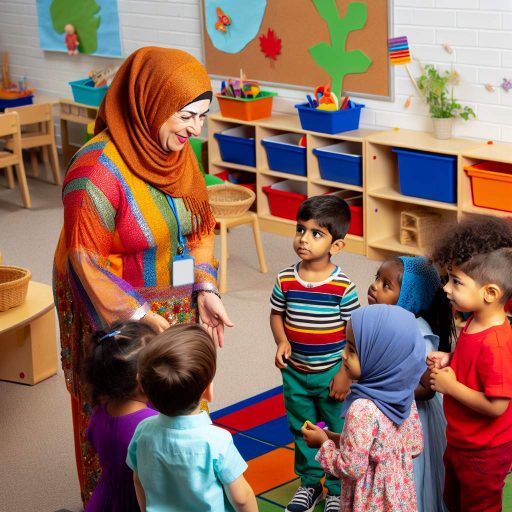Definition of Play and Its Significance in Cognitive Development
Understanding Play
Play is an essential part of early childhood education.
It encompasses various activities that engage children physically and mentally.
Moreover, play encourages creativity and imagination in young learners.
Through play, children explore their surroundings and learn about social interactions.
Play’s Role in Cognitive Development
Cognitive development refers to how children think, learn, and solve problems.
Play significantly influences this development by enhancing critical thinking skills.
When children play, they engage in problem-solving activities.
These experiences help build their reasoning skills.
Additionally, play supports memory retention and recall abilities.
Social Benefits of Play
Play also fosters essential social skills among young children.
Through collaborative play, kids learn to work together and share resources.
This collaboration cultivates communication and negotiation skills.
Furthermore, it teaches children empathy and respect for others.
The Emotional Impact of Play
Engaging in play can significantly bolster a child’s emotional well-being.
It allows them to express feelings in a safe environment.
Play also enables children to manage stress effectively.
Through role-playing, children can navigate complex emotions.
This practice contributes to better emotional regulation in later life.
Importance of Play in Development
Play is vital for cognitive, social, and emotional development.
Early childhood education programs should prioritize play-based activities.
Doing so will help prepare children for future learning challenges.
Overview of Different Types of Play
Structured Play
Structured play involves organized activities with specific goals.
Typically, an adult or facilitator guides these activities.
This type of play often includes games with rules.
Structured play can enhance children’s focus and cognitive skills.
Unlock Your Career Potential
Visualize a clear path to success with our tailored Career Consulting service. Personalized insights in just 1-3 days.
Get StartedCommon examples are team sports and educational games.
Moreover, it promotes social interaction among children.
For instance, children learn to work together to achieve goals.
Such cooperation helps develop communication skills.
However, too much structure may limit creativity.
Unstructured Play
Unstructured play allows children to explore freely.
This play type typically has no predefined rules or objectives.
Children engage in this play independently or in groups.
It encourages imagination and problem-solving skills.
Examples include playing with blocks or pretending to be superheroes.
Unstructured play also fosters physical development.
For example, climbing and running enhance gross motor skills.
Additionally, it provides children with a sense of autonomy.
The Role of Both Types in Learning
Both structured and unstructured play play vital roles in learning.
They cater to different developmental needs and outcomes.
Structured play can teach discipline and teamwork.
Conversely, unstructured play fosters creativity and innovation.
Importantly, incorporating both types leads to well-rounded growth.
Educators should create environments that offer varied play experiences.
For instance, balancing structured activities with free play enhances overall development.
Ultimately, children’s engagement in both types prepares them for future challenges.
The Impact of Play on Social Skills and Emotional Development in Early Childhood
Enhancing Social Skills
Playtime significantly boosts children’s social skills.
Through play, children learn to communicate effectively with peers.
They practice sharing and cooperation in group activities.
Playing together fosters teamwork and understanding among children.
As a result, they develop better conflict-resolution skills.
Play also encourages empathy as children learn to consider others’ feelings.
Promoting Emotional Development
Engagement in play nurtures emotional intelligence in young children.
During play, kids experience a range of emotions, fostering self-awareness.
This helps them recognize their own feelings and those of others.
Moreover, play allows children to express themselves freely.
This expression is crucial for emotional regulation and coping skills.
Regular playtime leads to increased resilience in the face of challenges.
Building Relationships
Play provides a foundation for building strong relationships.
Children learn trust through cooperative games and joint efforts.
These interactions help to establish friendships with peers.
As friendships form, children gain a sense of belonging.
Belonging fosters a positive self-image and social confidence.
Encouraging Creativity and Problem-Solving
Play encourages creativity, an essential aspect of development.
When children engage in imaginative play, they think critically.
They learn to approach problems in innovative ways.
This creativity translates into improved cognitive skills.
Additionally, play often requires decision-making and planning.
Such experiences strengthen children’s problem-solving abilities.
Explore Further: The Growing Demand for Instructional Designers in Canada
Connection Between Play and Physical Development
Enhancing Motor Skills Through Play
Play is essential for developing motor skills in young children.
It allows children to practice both fine and gross motor skills.
Activities like running, jumping, and climbing promote gross motor skills.
Simultaneously, tasks like drawing or building with blocks enhance fine motor skills.
Children gain coordination and balance through active play experiences.
This physical development is crucial for their overall growth.
Additionally, play improves strength and endurance in children.
Engaging in various physical activities fosters a healthy lifestyle.
Moreover, play encourages flexibility and agility in movements.
Children often try new movements while at play, boosting their confidence.
Social Interaction and Physical Play
Play promotes social interaction among children, enhancing their development.
During play, children learn to cooperate and share with others.
This interaction also helps them develop communication skills.
Physical play often includes team activities that foster collaboration.
Through group games, they learn to navigate social rules.
These experiences teach them valuable lessons about teamwork.
Furthermore, they learn how to resolve conflicts during playtime.
Such skills are essential in both school and future workplaces.
Structured vs. Unstructured Play
Both structured and unstructured play benefit physical development.
Structured play involves set rules and organized activities.
This form allows children to focus on specific skills.
Unstructured play, on the other hand, encourages creativity and exploration.
Children engage freely, using their imagination to create their activities.
Both types of play contribute to overall physical development.
A balance of both ensures a well-rounded approach to growth.
Uncover the Details: Balancing Creativity and Curriculum in Early Childhood Education
Play as a Tool for Fostering Creativity and Problem-Solving Abilities
The Role of Play in Creativity
Play encourages children to express their imagination freely.
It provides a safe space for them to explore ideas and concepts.
Through role-playing, children learn to think creatively.
Additionally, they develop original solutions to various scenarios.
This process enhances their cognitive development significantly.
Building Problem-Solving Skills
Play often involves challenges that require strategic thinking.
Through play, children encounter and navigate obstacles.
This builds resilience and adaptability in different situations.
Moreover, they learn to adjust their strategies as needed.
Such experiences are crucial for developing problem-solving skills.
Social Interaction and Collaboration
Play also promotes social interaction among peers.
During group play, children practice teamwork and communication.
They learn to negotiate roles and share resources effectively.
These interactions foster empathy and understanding in diverse contexts.
Encouraging Inquisitiveness
Children naturally ask questions during playtime.
This inquisitiveness drives their desire to learn more about the world.
They engage in exploration, testing hypotheses and making discoveries.
This process enhances their reasoning abilities.
Long-Term Benefits of Play
Emphasizing play in early education cultivates lifelong skills.
Creativity and problem-solving are essential in adulthood.
Thus, investing in play-based learning sets a foundation for future success.
Discover More: Challenges Corporate Trainers Face and How to Overcome

The Role of Educators and Caregivers in Facilitating Play in Educational Settings
Creating an Inviting Environment
Educators and caregivers set the stage for play through thoughtful classroom design.
They arrange spaces that inspire exploration and creativity.
Every corner and item can spark curiosity in young minds.
Encouraging Imaginative Play
It is essential for educators to encourage imaginative play among children.
They can provide materials that ignite the children’s imagination.
Toys and props serve as catalysts for storytelling and role-playing.
Observing and Assessing Play
Caregivers must actively observe children’s play activities.
This observation helps them understand each child’s interests and skills.
Through careful assessment, they can tailor activities to enhance learning.
Facilitating Social Interaction
Fostering social connections is a key role of educators in play settings.
They can create group activities that promote teamwork and collaboration.
By facilitating these interactions, children learn vital social skills.
Modelling Positive Behavior
Educators and caregivers should model positive behaviors during playtime.
This includes sharing, taking turns, and expressing emotions appropriately.
Children learn by observing the actions of trusted adults.
Incorporating Learning Objectives
Play can be a dynamic way to achieve educational goals.
Educators should weave learning objectives into playful activities.
For instance, counting games can enhance numeracy skills while playing.
Supporting Emotional Development
Play provides an excellent opportunity for emotional expression.
Caregivers can guide children through conflicts that arise during play.
This support fosters emotional resilience and understanding.
Encouraging Independence
Educators can promote independence by allowing self-directed play.
Children learn to make choices and solve problems independently.
Such experiences build confidence and self-efficacy.
Providing Feedback and Guidance
Feedback is essential during children’s play experiences.
Educators can guide children with constructive feedback that enhances learning.
This support ensures that play remains a valuable educational tool.
Uncover the Details: Impact of Curriculum Developers on Student Outcomes
Examples of Play-Based Learning Activities and Their Outcomes
Outdoor Exploration
Children learn through nature when they explore outdoor environments.
Nature trails encourage curiosity and robust physical activity.
This type of play enhances observation and critical thinking skills.
Teachers can guide discussions about plants and animals during walks.
Consequently, children develop a deeper appreciation for nature.
Imaginative Role-Playing
Role-playing activities allow children to explore various social roles.
For example, they can act as doctors, teachers, or family members.
This encourages empathy and understanding of different perspectives.
Children negotiate roles and set rules, enhancing communication skills.
Furthermore, role-play fosters creativity and problem-solving abilities.
Art and Craft Projects
Art activities promote self-expression and fine motor skills.
Children can use diverse materials, such as clay or paint.
These projects encourage experimentation with colors and textures.
Moreover, children learn to follow instructions and share materials.
As a result, art projects can also strengthen social interactions.
Collaborative Games
Group games foster teamwork and cooperation among children.
For instance, playing tug-of-war builds physical strength and unity.
Children learn to communicate effectively and make group decisions.
Collaboration enhances their conflict resolution skills significantly.
Moreover, these games promote a sense of community within the classroom.
Storytelling and Literacy Activities
Storytime enhances language development and listening skills.
Children engage with stories through discussions and role-playing.
This interaction cultivates a love for reading and comprehension skills.
They learn to articulate thoughts and reactions to narratives.
Additionally, storytelling fosters imagination and creativity in children.
Challenges in Incorporating Play into Early Childhood Education Programs
Understanding the Resistance to Play-Based Learning
Many educators believe structured learning is more effective.
This mindset often leads to a neglect of play-based activities.
Additionally, high-stakes testing pressures can limit creative teaching.
Consequently, teachers may feel forced to prioritize academic skills.
Balancing Curriculum Requirements and Play
Educational standards can impose rigid curricula on early childhood programs.
This pressure can diminish the role of free play in lessons.
Children often learn best through exploration and creativity.
Thus, educators must find ways to integrate play into the curriculum.
Managing Resources and Training
Many early childhood educators lack proper training in play-based pedagogy.
This gap in knowledge can hinder effective implementation of play strategies.
Furthermore, limited resources can restrict the availability of play materials.
Therefore, investing in training and materials is essential for success.
Potential Solutions to Incorporate Play Effectively
Advocating for Play-Friendly Policies
Educators should advocate for policies supporting play-based learning.
Collaboration with policymakers can help promote these changes.
Additionally, sharing success stories can inspire other educators.
Creating a Balanced Curriculum
Curriculums should include both structured and unstructured learning opportunities.
Integrating play into daily activities ensures comprehensive development.
Moreover, maintaining flexibility allows adjustments based on children’s interests.
Investing in Professional Development
Ongoing professional development can empower educators to use play effectively.
Workshops on play-based strategies can enhance teaching methods.
Networking with other educators helps share valuable resources.
Enhancing Resources and Play Materials
Investing in high-quality play materials enriches learning experiences.
Creating diverse play areas stimulates children’s imaginations.
Encouraging parental involvement can also expand resource options.
Additional Resources
The Power of Playful Learning in the Early Childhood Setting | NAEYC




